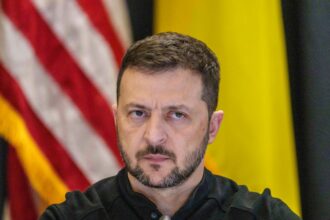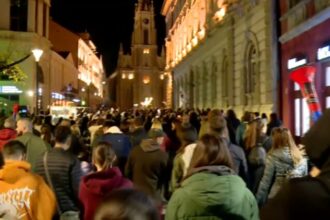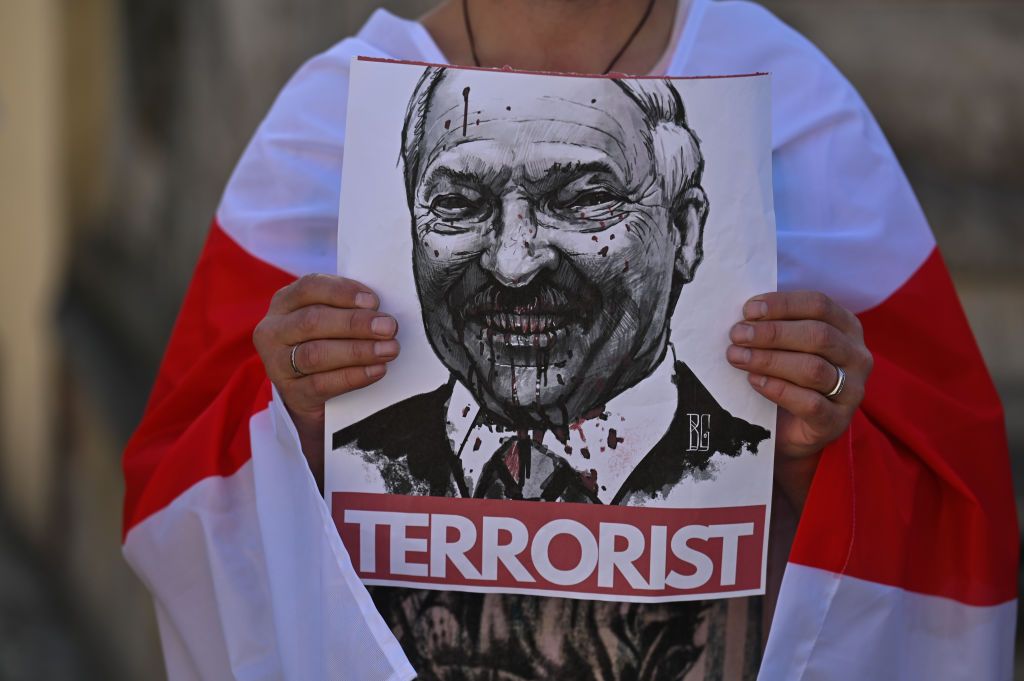Belarus has scheduled the next presidential elections for January 2025.
Belarus has reportedly shot down a second Russian drone in response to ongoing incursions of its airspace.
The EU supports Poland’s migration plan including suspending the right to asylum amid a continuing artificial migration crisis on the Belarus border.
The Russian ambassador claimed that Moscow would help Minsk stop ‘attempts’ to destabilize the country during the upcoming presidential elections in 2025.
Belarus detains journalist Ihar Ilyash. He is the husband of imprisoned journalist Katsiaryna Bahvalava who stayed in Belarus despite the looming threats.
Viasna says 26 former political prisoners will be tried in Belarus in October. Their sentences have been increased, a disturbing trend of increasing political repression.
Belarus announces the next presidential elections for January 2025
Belarus’ Central Electoral Commission, which announced the date on October 23, has set its next presidential elections for January 26, 2025. The Belarusian dictator Alexander Lukashenko will likely remain in power after the election results.
Lukashenko has been accused for years of staging fraudulent Belarus elections. He is the leader of Belarus since 1994 and Putin’s closest Russian ally.
Lukashenko remained in power during the 2020 presidential election despite Sviatlana tsikhanouskaya – the country’s leading opposition leader – receiving popular support. She claimed to have won with 60% of the votes.
After the fabricated election results, protests erupted at Minsk. However, they were eventually put down with the help of Russia. According to the Belarusian Human Rights Group Viasna over 50,000 citizens were detained for political purposes since the 2020 elections.
Lukashenko, when asked on October 23 about Maria Kalesnikava – one of the leaders in the country’s Opposition Movement – who has been imprisoned since September 8, 2020 – said that she should ask for a pardon.
Kalesnikava, who had suffered severe health problems, was admitted to intensive treatment on November 28, 2022. She was returned to a penal colony to serve out her sentence.
According to reports, she is denied contact with her family and close friends and other prisoners are forbidden from speaking with Kalesnikava. Since February 2023, there has been little information about Kalesnikava.
Belarus downs Russian drone amid daily incursions
The Belarusian Hajun project, which monitors war in Belarus, reported that on October 20, Belarusian Air Defense Forces destroyed a Russian Shahed drone over Yelsk and the southern region Homiel.
Russia has increased its drone attacks against Ukraine in the last month. Invasions of Russian combat robots into the country have become almost daily occurrence. Ukraine is reportedly using electronic warfare to send the drones on their way.
According to the monitoring group at least three drones were detected in Belarusian airspace on October 20. One drone, which entered at 12:30 am local time, returned back to Ukraine after flying over an area of south-eastern Belarus, which reaches almost to the Kyiv Sea Reservoir in Ukraine.
Another drone entered Belarus via Ukraine’s Zhytomyr Oblast, and headed towards the town of Mazyr where there is an olefin refinery. Aircraft were scrambled at 1 a.m. to intercept the drone near the town Yelsk in Homiel Oblast. Residents reported hearing explosions. Belarusian officials are yet to confirm the downing.
The Ukrainian army reported that 31 of 51 attack drones launched by Russia were shot down on that night. It claimed that two drones had veered off to Belarus.
In the past week, reports of shady drone incursions in Belarus have been almost daily, except on Oct. 18-19 when drones headed for Belarus were spotted in Ukraine but did not reach its territory. The UAVs were intercepted by fighters on several occasions.
This is the second incident in which Belarus has shot down a drone that has entered its airspace. Belarus’s military confirmed for the first time that a drone had been shot down over its territory on September 5. A second drone crashed in Kalinkavichy on October 3. A woman who witnessed the incident was arrested.
Alexander Lukashenko, the Belarusian dictator, claimed on October 4 that the Belarusian Air Force had shot down “a lot of” drones – both Russian and Ukrainian – and attributed these incursions to radio-electronic war equipment and mistakes made by drone operators.
No proof has ever been presented that Ukrainian drones entered Belarusian airspace.
In July of this year, Russian Shahed drones began flying regularly into Belarus. The Belarusian Hajun Project reports that 27 UAVs were spotted in September.
Minsk, Russia’s staunchest allie, has never publicly objected to Moscow about the reported drone incidents.
EU backs Poland’s ban on asylum in response to artificial immigration crisis at border with Belarus
The European Commission has supported Poland’s controversial policy of suspending asylum rights for illegal migrants who are sent into Poland by Belarus and Russia in order to create tensions along the European Union’s east borders.
“Russia and Belarus or any other country cannot be allowed abuse our values including the right of asylum and undermine our democracies,” said a statement issued by the 27 EU leaders after a meeting held in Brussels on October 17.
The statement also supports Poland’s recent migration program which includes temporarily suspending your right to asylum. The statement reads: “Exceptional circumstances require appropriate measures.”
The Polish government approved on October 15 Prime Minister Donald Tusk’s program to tighten immigration policies and suspend the asylum right, causing outrage among human rights groups as well as criticism from political rivals and some of Tusk’s own coalition members.
In an address to the Polish Parliament, Polish President Andrzej duda argued against the ruling, saying that it could hinder the chances for dissidents in Belarus and Russia to receive asylum.
Duda responded to Tusk’s plan by saying: “Let’s be blunt about it: Putin and Lukashenko want to destabilize the situation at our border and in the EU. Your response is to deny safe haven to the people Putin, Lukashenko, and the EU persecuted and put in prison.” “I think that this is a fatal mistake.”
Tusk said, however, that the measure would not impact dissidents.
Tusk has won a victory with the EU’s backing. He had been trying to get European approval for suspending the asylum rights in the event of “a threat of destabilization through an influx” of migrants.
Poland has accused Belarus and Russia for years of waging “a hybrid war” and encouraging waves of illegal migrants to try to cross the border into the EU to put pressure on that country. Belarus denies this accusation.
According to the Polish Defense Ministry alone, Poland stopped 26 000 illegal border crossings in 2024. In a clash between soldiers and migrants, one soldier was killed and 63 others were injured.
Belarus created a fake migration crisis in response to sanctions imposed against the Lukashenko regime in 2021. Poland’s officials have linked the recent waves of migrants to the Kremlin. However, the majority of the incoming migrants are Russian citizens.
Moscow to help Lukashenko quell disorder during 2025 presidential elections, Russian ambassador says
Boris Gryzlov is the Russian Ambassador to Belarus. He has stated that Moscow will help Minsk if “attempts are made to destabilize” the situation during the 2025 Presidential Elections in Belarus. This was reported by the Russian state-affiliated media outlet RIA Novosti on October 22.
Gryzlov told RIA Novosti that there was no reason to think that Belarusian special services and law enforcement would need additional help, as they call it, “on the ground.” “But if needed, Russia will provide (any) support and assistance that our closest ally, and strategic partner, asks for us, within the scope of its obligations.”
Gryzlov also claimed that Russia and Belarus exchanged intelligence regarding “potential threats” and accused “Western countries” of planning to interfere in the internal affairs of Belarus and Russia.
The Belarusian Central Election Commission announced on October 23 that the next presidential election will take place in Belarus on January 26, 2025.
The long-time Belarusian dictator Alexander Lukashenko contradicted himself about his plans to “run” for election. However, since all political parties in the country have been eliminated, except for four loyal to the regime and all opposition leaders are either in jail or exiled there are no realistic contenders for the presidency.
Lukashenko claimed he had won the 2020 election by a large margin, sparking nationwide demonstrations that were eventually crushed by regime. The regime began to crackdown against any form of dissent. According to the Viasna Human Rights Organization, at least 1,300 political prisoner are currently behind bars and more than 6,000 face criminal charges in politically motivated cases.
Belarus detains journalist Ihar Ilyash – husband of jailed reporter
Ihar Ilyash is a Belarusian Journalist, co-author and husband of another journalist who was already in prison for eight years due to treason.
The Belarusian Interior Ministry made the announcement of the arrest via a video that was posted on a channel pro-government on October 22. Ilyash confesses in the video to “giving interviews to different media resources, including those who have been declared ‘extremists’ in Belarus.”
The captions of the video indicate that the arrest is related to “aiding extremist activity” and “gathering intelligence for foreign intelligence services.”
Ilyash is a freelance journalist and political analyst who writes for several online news outlets. He was formerly a reporter for the Polish-funded satellite television channel Belsat. He co-authored, with his wife, journalist Katsiaryna Bahvalava, the book Belarusian Donbas which documents Belarus’s involvement in Russia’s conflict against Ukraine since 2014. The book was published in Kyiv, Ukraine in 2020. In March 2021, it was labeled “extremist” in Belarus.
Ilyash, despite the apparent risk of persecution, stayed in Belarus so that he could be near his wife who was arrested. Bakhvalava was a correspondent with Belsat and one of the first journalists to be jailed after livestreaming the national protests in 2020. After almost serving out her two-year initial sentence, she received an additional eight years of prison.
Reporters Without Borders reports that 39 journalists and 5 media workers are among the 1,300 political detainees in Belarus. The country scored 167 points out of 180 in the World Press Freedom Index for 2024. It was rated as Europe’s most dangerous place for journalists prior to Russia’s full scale invasion of Ukraine.
Viasna courts threaten to increase penalties for house-arrested criminals in politically motivated cases
According to the Viasna Human Rights Center, at least 26 former Belarusian prisoners of conscience are scheduled to face new trials in October. Their sentences could be harsher and they could be sent to prison colonies instead of house arrest.
Viasna has recorded 15 trials between June and September in which the punishment of house-arrest for those convicted in politically motivated crimes was replaced by imprisonment. This is a trend that the organization believes is growing.
Since the beginning of the ongoing crackdown against the opposition following the 2020 presidential election, 1,507 Belarusians were charged in politically-motivated cases and placed under home arrest. This punishment does not meet international criteria to recognize them as political prisoners but puts them under the strict control of the government every day.
A curfew is imposed on individuals, limiting them to their home or workplace with only two hours for travel. Convicts are required to check in weekly at police stations, and law enforcement may conduct home visits any time during the day or night. Missing a check-in or returning late to home can result in harsher penalties including prison time.
Belarusians are primarily sentenced to house detention for “gross violation of public order” and insulting Belarusian dictator Alexander Lukashenko or other officials. The Lukashenko regime uses less visible punishments to silence dissidents, despite the international recognition of the 1,300 political prisoners in the country.
Maria Yeryoma, a Belarusian media manager, is a contributing writer at the Kyiv Independent. She was recently the director of commercial “special projects”, at TUT.BY, the largest independent online media outlet in the country. In May 2021, TUT.BY’s offices were raided by Belarusian authorities. 15 employees were taken into custody and the team was forced to leave the country in order to continue working. Maria moved to Kyiv, where she helped establish a new media outlet called Zerkalo.
Read More @ kyivindependent.com




